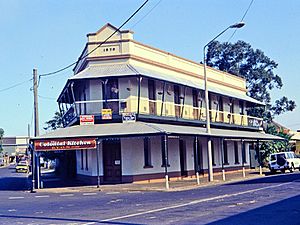Engineers' Arms Hotel facts for kids
The Engineers' Arms Hotel is a special old building in Maryborough, Queensland, Australia. It used to be a hotel and is now protected because of its history. It was designed by Samuel Bragg and built in 1889. It's also known as the Mayfair Boarding House. This building is listed on the Queensland Heritage Register, which means it's an important part of Queensland's past.
Quick facts for kids Engineers' Arms Hotel |
|
|---|---|

Former Engineers' Arms Hotel, 1995
|
|
| Location | 115 March Street, Maryborough, Fraser Coast Region, Queensland, Australia |
| Design period | 1870s - 1890s (late 19th century) |
| Built | 1889 |
| Architect | Samuel Bragg |
| Official name: Engineers' Arms Hotel (former), Mayfair Boarding House, Former Engineers' Arms Hotel | |
| Type | state heritage (built) |
| Designated | 21 October 1992 |
| Reference no. | 600695 |
| Significant period | 1880s (fabric) 1889-1950s? (historical use as pub) |
| Builders | Mr Caldwell |
| Lua error in Module:Location_map at line 420: attempt to index field 'wikibase' (a nil value). | |
Contents
A Look Back in Time
Building the Hotel
The Engineers' Arms Hotel was built in 1889 for Ann Dillane. It was designed by Samuel Bragg, a local architect. This new building replaced an older hotel that had the same name.
Maryborough started as a small settlement in 1847. It grew quickly because it was a good place for ships to stop on the Mary River. By 1859, it was an official Port of Entry. In 1861, it became a town.
Why Maryborough Grew
During the 1860s and 1870s, Maryborough became very important. It was the main port for the nearby Gympie goldfield. Gold from Gympie was shipped out from Maryborough. The town also became known for its timber and sugar industries. Factories and other businesses helped Maryborough keep growing into the 1900s.
The First Hotel
The land where the hotel stands was first bought in 1861. Thomas Dillane bought it in 1872. He had been running the older hotel on the site since at least 1870. The hotel got its name, "Engineers' Arms," because it was next to the Walkers' Engineering Works and Foundry. This factory started in 1868. It made mining equipment for the goldfields. The date "1870" on the building might show when the first hotel was built.
A New Building
By 1889, rules for hotels were becoming stricter. Hotels needed to be in good condition. This might be why the old Engineers' Arms Hotel was replaced. The new building was made of brick and had two floors. Samuel Bragg, who used to work for the government, designed it. A local builder named Mr Caldwell constructed the hotel. It was ready for business on July 5, 1889.
Two small brick cottages were also built behind the hotel. These were likely for people to live in. Over time, the top floor verandah of the hotel was made narrower. This happened because some of the old timber had rotted.
What it is Now
The Engineers' Arms Hotel stopped being a hotel in 1951. After that, it was used as the Mayfair Guest or Boarding House. It has also been a restaurant and a community center. Today, it is used for accommodation and has commercial spaces.
What the Building Looks Like
The former Engineers' Arms Hotel is a two-story building made of brick. The bricks are covered with a smooth finish. It is located at a four-way intersection. Behind the main hotel, there are two smaller brick buildings.
The hotel has a roof hidden by a decorative wall called a parapet. The building is shaped like a "V" because it sits on a pointed block of land. The corner of the building is special. It has a triangular part that sticks up above the roof. You can see the date "1870" carved into the wall on this corner.
Verandahs and Entrances
The hotel has verandahs on three sides: March, Kent, and Bowen Streets. The ground floor verandah has a curved roof. It is held up by metal posts. Some of these posts have been replaced. The top floor verandah has a sloping roof. It is supported by wooden posts that lean outwards. This is because the walkway on the verandah was made narrower.
There are three ways to enter the hotel from the main streets. One entrance is on the corner. It has a double wooden door and used to lead to the public bar. On March Street, there are two more entrances. One is an arched doorway with glass panels on the sides and above. The other is a wooden door with four panels. Many of the original wooden parts, like doors and window frames, are still there and look very nice. Inside, the building still has many of its old wooden features, ceiling decorations, and fireplaces. The way the rooms are laid out is still mostly the same.
Why it's a Heritage Site
The former Engineers' Arms Hotel was added to the Queensland Heritage Register on October 21, 1992. This means it is considered an important historical place.
Showing Queensland's History
This building helps us understand how Queensland grew. It shows how Maryborough became important, especially during the Gympie gold rush. The hotel is in an area where mining equipment was made for the goldfields.
Beautiful and Interesting
The hotel is a key part of the streets in Maryborough. It is a good example of what country town hotels looked like in Queensland a long time ago. Its design is quite interesting.
Important to the Community
For over a hundred years, the Engineers' Arms Hotel was the local gathering place for workers from the nearby factory. Because of this, it has a strong connection to the community around it.
 | James Van Der Zee |
 | Alma Thomas |
 | Ellis Wilson |
 | Margaret Taylor-Burroughs |

